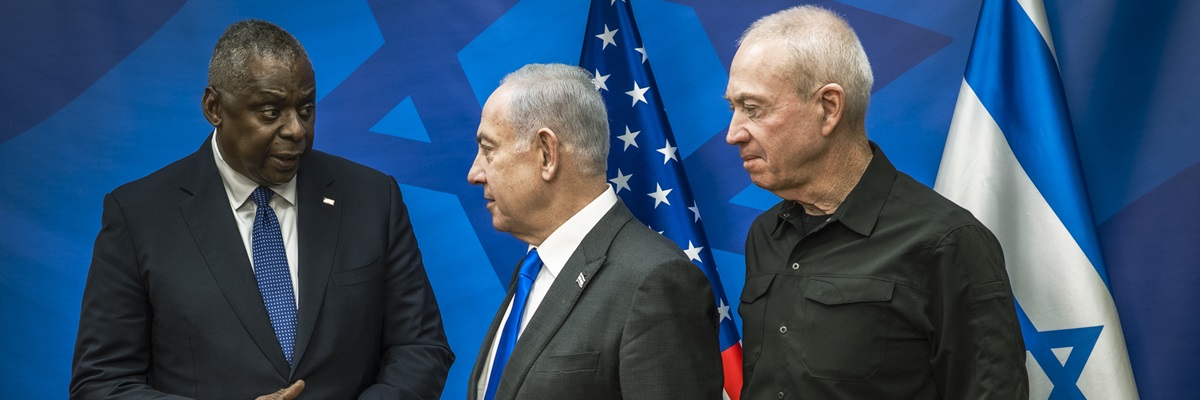Defense & Security
The Primacy of Foreign Policy in Reverse: Israel’s War Aims After the Assassination of Ismail Haniyeh

Image Source : Wikimedia Commons
Subscribe to our weekly newsletters for free
If you want to subscribe to World & New World Newsletter, please enter
your e-mail
Defense & Security

Image Source : Wikimedia Commons
First Published in: Aug.23,2024
Sep.09, 2024
Whether or not Israel claims responsibility for the death of Ismail Haniyeh, his assassination abroad may not have improved Israel’s prospects at home. Bringing the war to a conclusion will require a credible correlation of ends and means. In diplomatic history, the “primacy of foreign policy”—with its emphasis on managing external threats, dealing with geography, and the uses of diplomacy—is a concept associated with nineteenth-century German historian Leopold von Ranke, and with the calculations by which Otto von Bismarck brought a Prussian-led Germany into existence. In twentieth-century historiography debates, Eckart Kehr was one figure who argued from the opposite corner, proposing that the primacy of domestic politics exerted its force on statecraft through economic interests, social conditions, and other factors shaping foreign policy from within. In the United States, interactions between domestic interests and foreign policy were analysed by John J. Mearsheimer and Stephen M. Walt in their 2006 paper “The Israel Lobby and U.S. Foreign Policy.” The authors argued that their country’s Middle East policy was “due almost entirely to U.S. domestic politics, and especially to the activities of the ‘Israel Lobby’.” Their paper, and subsequent book, have been both influential and contested—though of course the idea that such a lobby exists was not new. The 1961 memoirs of Sherman Adams (President Dwight D. Eisenhower’s Chief of Staff) include remarks on the “many well-organized pro-Israel lobbies that were always effective and influential in the Capitol.” In the case of Israel itself, management of security at and within sovereign borders has been distinctively complicated since Israel’s declaration of statehood in 1948, which provoked five Arab states to send in their armies in contestation of the borders Israel had proclaimed. The status of these borders, and what constitutes Israel’s rightful contiguous territory inside them, have been the subject of ongoing contention and intermittent war ever since. With the Declaration of Principles on Interim Self-Government Arrangements (Oslo Accords) of 1993, it was thought by some that political, territorial, and institutional dimensions of a Palestinian state were now realities that could be brought into existence alongside Israel. Whether noble or credulous, such thoughts have not produced political realities during three subsequent decades of administrative activity overseen by the Palestinian Authority (PA)—an entity that has rested on an unpromising basis, especially since the Middle East Quartet disqualified Hamas from being its governing party, following Hamas’ electoral victory in 2006. Financially dependent on external beneficence and Israeli tax and banking, and cooperating with Israel in managing security in the West Bank, the PA since 2006 has also operated without obvious popular legitimacy. While Israel has not been threatened by the forcible establishment of a Palestinian state over these decades, managing Palestinians in the West Bank, East Jerusalem, and especially in Gaza has been an ongoing challenge for Israel’s government and security establishment. Hamas’ attack on Israel on 7 October 2023 ended what Tareq Baconi has described as the containment of Palestinian resistance in Gaza. Over the following ten months, Israel’s siege on Gaza and responses to volatility in the West Bank have had aims that could be called domestic policy; to eliminate Hamas militarily and kill its leaders, to rescue Israeli hostages in Gaza, and to restore domestic security in Israel by preventing a Hamas-led threat from ever confronting Israel again. As of August 2024, Israel’s war aims have yet to be achieved, although Hamas’ military capabilities have been reduced, senior figures have been killed, and a small number of hostages have been rescued. Meanwhile violence between Israeli settlers and Palestinians in the West Bank, civil unrest in Tel Aviv and Jerusalem, and difficult domestic matters such as the drafting of haredi (ultra-orthodox) Jews into the Israeli Defense Forces have accompanied disunity in Israel’s government and divisions and disagreements between Prime Minister Benjamin Netanyahu and his Defense Minister and military Chief of Staff. With the domestic objectives of the war unachieved, and the restoration of post-war stability not yet within Israel’s grasp, the primacy of international factors has come more obdurately into view over the course of the year. This is not only a matter of international threats (arising from an incipient multi-front war), but also a matter of international progress toward a ceasefire—since internationally-mediated hostage diplomacy (via Qatar and Egypt) is the only mode in which limited negotiation between the adversaries has been possible, and was the only means through which, in November 2023, a large number of Israeli captives could be released. But while internal and external factors have neither merged into an Israeli victory, nor been resolved into separately successful domestic and foreign policies, the assassination of Hamas’ leader Ismail Haniyeh on 31 July, and the subsequent appointment of Yahya Sinwar as head of Hamas on 6 August, have now brought domestic and international aspects of Israel’s war into newly fraught relations. The combination of volatility and stasis can be seen both abroad and in Gaza. Abroad, Israel has not claimed responsibility for the death of Haniyeh. But since the assassination happened in Iran (during Haniyeh’s visit to attend the swearing-in of new President Masoud Pezeshkian), Iranian Supreme Leader Ali Khamenei has said it is Iran’s “duty” to “avenge the blood” of Haniyeh. The threats may not lead to significant Iranian action, considering the consequences that Iran might then face from an Israeli counter-attack. But regardless of the prospect of retaliation by Iran itself, regional tensions have only risen as a result of Haniyeh’s death—and this can only be a source of increased uncertainty for Israel. In Gaza, the assassination of Ismail Haniyeh abroad has produced a condition for Israel that we could call the primacy of foreign policy in reverse. This condition pertains to headship of Yahya Sinwar, and to the internationally-mediated ceasefire and hostage talks through which Israel aims to save its citizens’ lives. Third-party mediators have played an essential role in the successes of hostage diplomacy thus far. But mediators—Qatari, Egyptian or others—can only mediate on the basis of demands made by the parties themselves, and those demands will necessarily be made by the senior decision makers on each side. Having eliminated a political chief who could operate independent of the siege on Gaza, it might be thought that Israel’s aim to dismantle Hamas is now coalescing in the prospect of killing one senior terrorist, contained in the coastal enclave. But such embodiment of war aims in one Hamas target is obviously spurious, and, as Khaled Hroub wrote a quarter of a century ago: “Even if the current organization is eliminated, it will reproduce itself once again in a new guise.” But the greater uncertainty following the assassination of Haniyeh pertains to the future of hostage negotiations with a Hamas now led by Sinwar. Assuming Sinwar is still located somewhere in Gaza, it does not seem likely that he will be any more accommodating as a hostage negotiator than he has been detectable as a target for assassination. Prime Minister Netanyahu may be drawn to accept US Secretary of State Antony Blinken’s recommendations for the talks’ next steps—but Blinken is expecting a lot by stating “It’s now incumbent on Hamas to do the same.” In these new conditions, the primacy of foreign policy in reverse consists in the fact that, having successfully eliminated a senior Hamas leader abroad, Israel may have reduced its chances of bringing its hostage citizens home alive.
First published in :

Benedict Moleta is a PhD student in the Department of International Relations at the Australian National University, writing on the work of Coral Bell. His master’s thesis (2020, University of Sydney) was on relations between the European Union and Palestine, focussing on the position and prospects of Hamas. Contact via ANU.
Unlock articles by signing up or logging in.
Become a member for unrestricted reading!